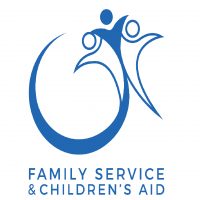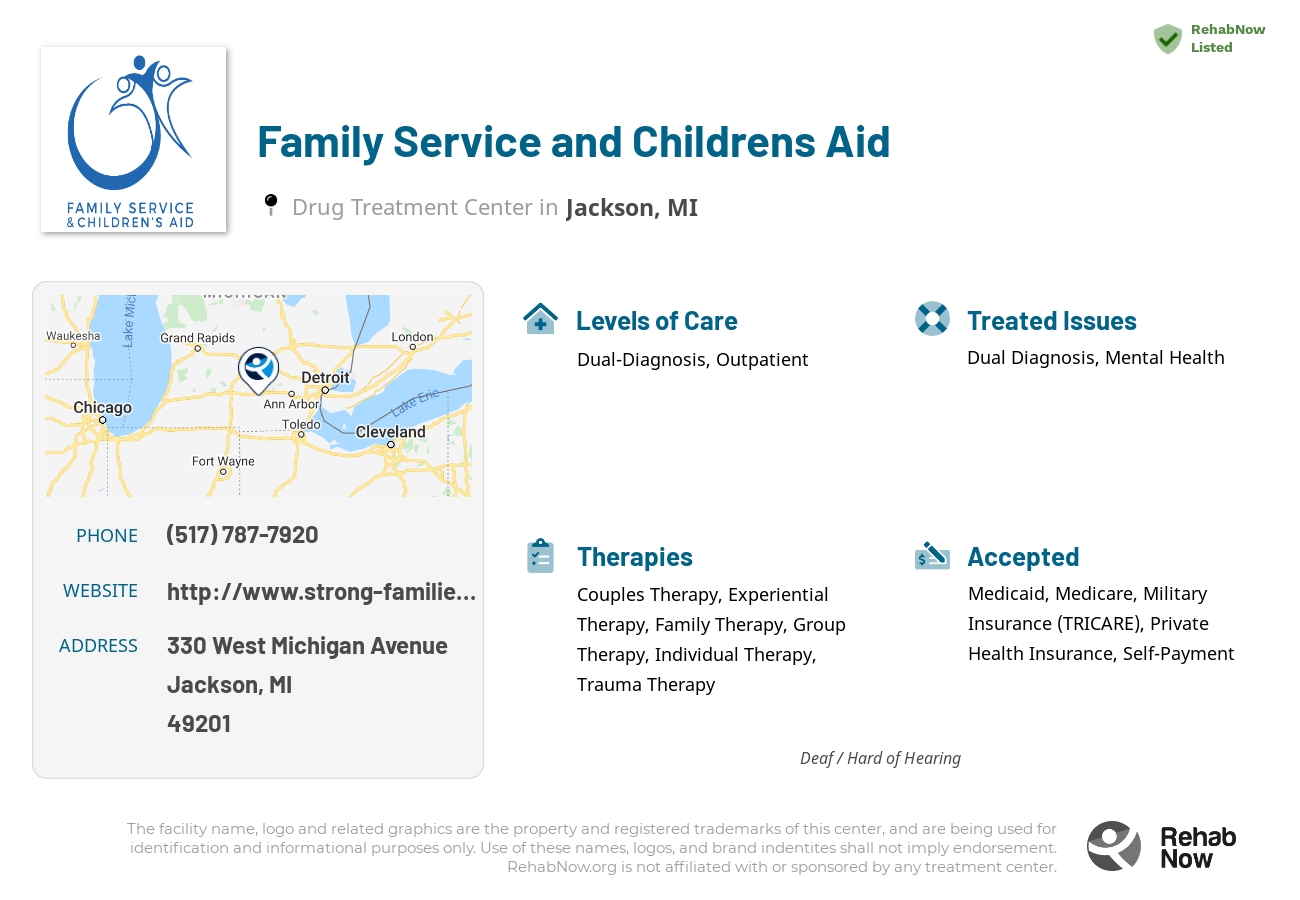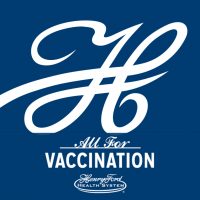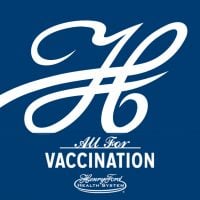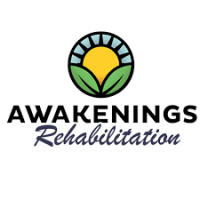Family Service and Childrens Aid
Drug Rehab Center in Jackson, Michigan
Family Service and Childrens Aid in Jackson, Michigan offers comprehensive behavioral health services, including addiction treatment, counseling, and prevention programs, to individuals and families struggling with substance use disorder.
About Family Service and Childrens Aid in Michigan
Family Service and Childrens Aid in Jackson, Michigan is a comprehensive behavioral health service organization that provides a wide range of services for children, adults, and families. They specialize in providing comprehensive treatment for addiction and substance use disorder, with a caring and professional staff on-site to offer support and guidance to individuals and families struggling with addiction.
Family Service and Childrens Aid provide a range of services to address substance use disorder, including evidence-based treatment, 12-step programs, counseling, and recovery coaching. They also provide specialized care for those with co-occurring mental health issues, along with the help of psychiatrists and social workers. Additionally, they offer education and prevention programs which are aimed at reducing substance use in the surrounding community.
Family Service and Childrens Aid is accredited by The Joint Commission and holds numerous licenses, including Medicare, TRICARE, and Medicaid. They also have been awarded a Certificate of Excellence from The Joint Commission for their efforts in providing exceptional care for those dealing with addiction and substance use disorder. Specialized programs such as their Inpatient Detox Center, Partial Hospitalization Program (PHP), and Intensive Outpatient Program (IOP) are also offered to help individuals and families achieve sobriety and stability.
Genders
Ages
Modality
Additional
Conditions and Issues Treated
A “dual diagnosis” is when the individual has two medical issues at the same time. The top co-occurring mental disorders with addiction are depression, anxiety, ADHD, bi-polar disorder. Addiction is also considered a mental illness that is not a choice but rather a medical condition. Addiction can be caused by any number of underlying issues.
Dual diagnosis is provided by Family Service and Childrens Aid to treat addictive tendencies as well as any untreated mental illnesses. This ensures successful long term health and recovery for patients after treatment has been completed.
Dual diagnosis is provided by Family Service and Childrens Aid to treat addictive tendencies as well as any untreated mental illnesses for people in Michigan. This ensures successful long term health and recovery for patients after treatment has been completed.Levels of Care Offered
This center offers a variety of custom treatment tailored to individual recovery. Currently available are Dual-Diagnosis, Outpatient, with additional therapies available as listed below.
Outpatient programs at Family Service and Childrens Aid, the Jackson resident can live with their family while continuing with their job or studies. Treatment includes educating the patient on drug abuse, medications, and counseling sessions at the individual or group level. Outpatient treatment plans cover diagnosis, detoxification, management, and counseling. They are a popular option for those who have graduated from inpatient facilities.
Therapies & Programs
Individual therapy is a form of counseling where you meet with a trained professional one-on-one. Meeting with a therapist in this setting allows for a personal and trusting relationship to be built. This allows the patient to open up about sensitive or private issues they may not feel comfortable discussing in a group. Individual therapy helps identify the root causes of your addiction, which can help prevent relapse.
Couples therapy for drug addiction is a unique form of therapy that allows family members to work through the emotional issues of their loved one’s addiction together. Family members can support each other while learning how to cope with the addiction and encourage healthy changes. The two will work with a therapist to learn how the addiction affects themselves and the relationship.
Family therapy is often done alongside drug treatment to help addicts stay sober. The goal of family therapy for drug addiction is to create an environment where communication can happen without judgment, hostility, or blame. The therapist will sit with the family so they can learn how to communicate differently and provide new tools for dealing with emotions so that people don’t want to drink or do drugs. It’s important for families to focus on relapse prevention plans during treatment so that if the addict feels like they want to use again, they’ll know what steps they need to take together to prevent it from happening again in the future.
Group therapy sessions are another common addiction recovery service. These group sessions typically involve six to 12 addicts who meet regularly with a trained professional for support and guidance.
During these sessions, the group shares their experiences with one another and provides feedback that can help each member avoid relapse or overcome specific obstacles they are facing in their recovery process. With this type of support and guidance, addicts can feel like they are part of a community that understands their struggles and will help them get through the hard times.
Many people struggling with drug addiction have experienced some form of trauma in their lives. It is crucial that these individuals seek out professional help; otherwise, their drug abuse and addiction will likely continue.
Therapists and counselors at drug treatment centers employ several treatment programs to help people struggling with drug addiction, including trauma therapy. Trauma therapy helps people dealing with addiction by allowing them to confront the traumas of their past and move past them.
It is important to note that trauma therapy should not be confused with PTSD (post-traumatic stress disorder). Rather, it is used to treat the effects of trauma, which are often at the root of addiction.
Cognitive Behavioral Therapy (CBT) focuses on the underlying thoughts and behaviors that caused the problem of addiction in the first place and may cause a relapse. Negative feelings are common in drug abuse disorders, but they can lead to co-occurring disorders if not recognized. CBT involves strategies that help to change the behavior pattern by restructuring negative thoughts into positive ones. It helps to remove these feelings, and it provides long-term benefits. Also, CBT promotes self-awareness and self-control. It can be administered as a monotherapy or as part of combination therapy.
CBT can improve the patient’s mood, reduce drug cravings and boost success rates on treatment plans. Regular practice can help individuals handle negative attitudes, thoughts, and feelings without turning to drugs or alcohol. The core belief of Cognitive Behavioral Therapy (CBT) is that one’s moods, behaviors, and actions are all connected. Individuals can improve their quality of life using CBT. It helps addicts understand the patterns of thought and feelings that cause them to use drugs or alcohol and develop a healthy response.
Patient Experience
Experiential Therapy at Family Service and Childrens Aid
Drug addiction causes the formation of abnormal connections between neurons in the brain to form due to repeated exposure to drugs. These connections are responsible for addictive behaviors to drugs. Experiential therapy is done with patients individually and is different from traditional talk therapy. This therapy can help people revisit past traumas, heal, and move on in life in a more authentic way.
Experiential therapy uses activities to recreate experiences that may have caused trauma or negative emotions. These activities include role-playing, arts and crafts, animal care, music, or rock climbing. The individual will gradually experience calmness and love and change their perception positively through this therapy. Other than drug addiction, experiential therapy can be helpful for behavioral or eating disorders.
Payment Options Accepted
For specific insurance or payment methods please contact us.
Is your insurance accepted?
Ask an expert, call (888) 674-0062
Additional Details
Specifics, location, and helpful extra information.
Jackson, Michigan 49201 Phone Number(517) 787-7920 Meta DetailsUpdated November 25, 2023
Staff Verified
Family Service and Childrens Aid Patient Reviews
There are no reviews yet. Be the first one to write one.
Jackson, Michigan Addiction Information
Michigan has the second-highest rate of drug and alcohol abuse in the nation. Heroin is linked to more than 50% of the state's hepatitis C cases. Marijuana is the drug most often associated with crimes in Michigan, followed by methamphetamines. Opioids alone are responsible for almost 20% of all drug overdose deaths in Michigan.
In Jackson, Michigan, there are more than 40 deaths caused by drug overdoses in 2013. This adds up to about 15% of all the fatal injuries in the city. The total number of arrests for drug-related crimes in 2012 was just over 1,500. The most common drugs of abuse are heroin, LSD, marijuana, crack cocaine, and methamphetamine.
Treatment in Nearby Cities
- Plymouth, MI (49.0 mi.)
- Hancock, MI (394.7 mi.)
- Portland, MI (49.8 mi.)
- Dowagiac, MI (88.9 mi.)
- Roscommon, MI (155.9 mi.)
Centers near Family Service and Childrens Aid
The facility name, logo and brand are the property and registered trademarks of Family Service and Childrens Aid, and are being used for identification and informational purposes only. Use of these names, logos and brands shall not imply endorsement. RehabNow.org is not affiliated with or sponsored by Family Service and Childrens Aid.
